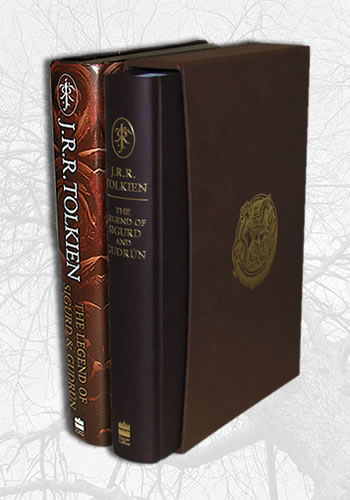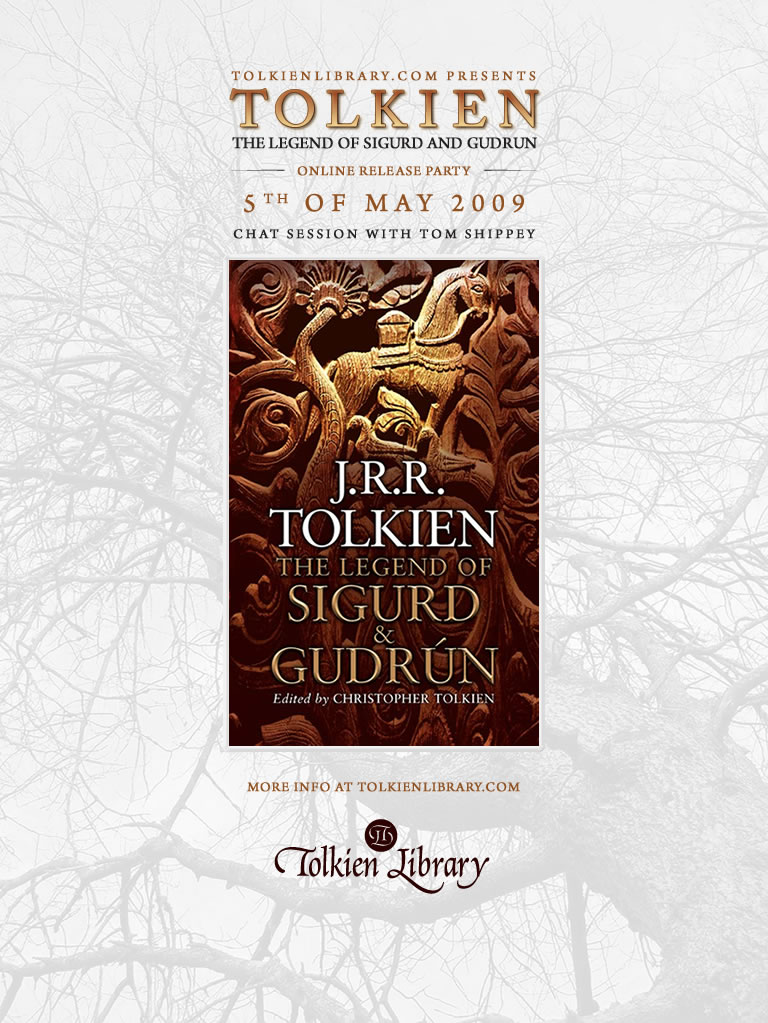Review: The Legend of Sigurd and Gudrun by J.R.R. Tolkien (02.05.09 by Pieter Collier) - Comments
In the introduction of the book, Christopher Tolkien dates this work to the earlier 30s, so just before he wrote "The Hobbit" and while he was professor of Anglo-Saxon at Oxford. The text was hidden away for many years but will be released worldwide on Tuesday, 5th of May 2009, by the writer's reclusive 84-year-old son Christopher, who has edited the book from his home in France.
The new book consists of two closely associated poems, to which Tolkien gave the titles "The New Lay of the Volsungs" and "The New Lay of Gudrun", based on the legends of Völsung and Nibelung. The two poems are written in modern English fitted to the Old Norse metre, and now appear for the first time as "The Legend of Sigurd and Gudrun."
The book starts with a nice introduction by Christopher Tolkien, followed by an introduction by his father J.R.R. Tolkien on "the Elder Edda"; where we get a chance to sit in tolkien's class and read (listen) how it would have been taking one of his lectures on Northern Mythology.
Next we get more explanations by Christopher Tolkien on the spelling of the names, the verse-form of the poems, the original text of the book and remarks added by J.R.R. Tolkien on small slips of paper.
Then follow the two poems, which tolkien's tireless son, Christopher, has footnoted, detailed with other versions and traditions. By the end, the detail is illuminating and overwhelming; nothing has been left out and everything has been added to make this book as best as possible. It is in all ways amazing! To say it with Christopher tolkien's words: "It seems to me that the publication of his poems provides an opportunity to hear the author himself, through the medium of the notes with which he prepared for his lectures, speaking (as it were) in characteristic tones on those very elements of doubt and difficulty that are found in the old narratives."
The poems, the "New Lay of the Volsungs" and the "New Lay of Gudrun," aren't however direct translations of the original "sources," which were "various in their nature, present obscurities, contradiction and enigmas." This book is J.R.R. tolkien's attempt to "organize the Edda material dealing with Sigurd and Gunnar."
As in all good sagas, there is a lot of betrayal, love, slaughter, and in the Norse tradition: dragons, dwarves, wolves, kings, queens, golden hoards and a lot of drinking.
The "New Lay of the Volsungs" deals with the life and death of the Volsung family. It mainly focuses on Sigurd, and tells how he slays the dragon Fafnir, whose treasure he takes for his own. Now a great hero, Sigurd awakens the Valkyrie Brynhild who slept surrounded by a wall of fire, but is told to come back when he has a kingdom. After swearing oaths of love Sigurd leaves Brynhild and soon comes to the court of the great princes, who are named the Niflungs, with whom he enters into blood brotherhood. In that court he finds great love but also great hate, brought about by the power of the enchantress, mother of the Niflungs, skilled in the arts of magic, of shape changing and potions of forgetfulness. Sigurd, overcome by an enchantment, marries the beautiful Gudrun instead, and then deceives Brynhild into marrying his friend, Gunnar. This mounts to its end in the murder of Sigurd at the hands of his blood brothers, the suicide of Brynhild, and the despair of Gudrun.
In the "New Lay of Gudrun" the saga continues. Here is told the fate of Gudrun after the death of Sigurd, her marriage against her will to the mighty Atli, ruler of the Huns, who covets the late Sigurd's dragon gold. When he doesn't get the treasure, he slaughters Gudrun's brothers, the Niflung lords. But Gudrun devices a hideous revenge, she retaliates by killing her two sons by Atli, which makes him collapse. Gudrun mocks him on his deathbed, sets the house on fire, escapes, and in the end, mournfully casts herself into the sea.
As you can see, this new book by J.R.R. Tolkien takes us on a trip to the Northern Mythologies. "The Legend of Sigurd and Gudrun" was an exercise in integration of ancient legend and myth. Some of his research even made it into his more famous work. For example in "The Hobbit," most of the dwarves were named out of the Edda. In this new book we can find the name "Mirkwood" and we can clearly see the link between this tale and that of "Turin Turambar"; but still this book is and I will repeat is once again "something completely different".
These tales come right from the 'real Middle-earth' and they give me a big understanding why Tolkien started his own mythology, which England was lacking. These old tales are so strong and so 'real' that I can imagine Tolkien was so excited about them he wanted to build something like this for England. The poems are at first hard to read, but the more you spent time with them the more they attract. At first I had the feeling that I was missing out on something, like I could not find the right rhythm, or that I was too overwhelmed by these 'new Tales', these 'new legends and mythologies' that I was presented. But the more I read the poems, the more addictive they got. These poems are of such a high quality, the tales themselves are so old and so touching, the extra info given by Christopher Tolkien so enlightening that I can only conclude that "the Legend of Sigurd and Gudrun" is a fantastic book. I'm already looking forward to the audio book, which will be very fascinating to listen to and suspect this book will be turned into a play, or will be read aloud on numerous occasions. When you read these poems you realize such poems find there origin in an oral tradition and you want to read them alound (and so I did read them myself).
I don't know whether all Tolkien fans will enjoy these poems, but I'm certain if they try and open up there hearts to it, these tales will leave a sound in there heads of old tales from the North.
The Legend of Sigurd and Gudrun Release Party is an online event to celebrate the publication of The Legend of Sigurd and Gudrun, the new book by J.R.R. Tolkien, first released worldwide on Tuesday 5th of May 2009. It will be released in the UK by Tolkien publisher HarperCollins and in the US by Houghton Mifflin.
It will be released both in hardback and deluxe edition. More info on the new Tolkien book can be found in the Legend of Sigurd and Gudrun FAQ.
Here you can read an interview with the illustrator Bill Sanderson.
The release event will take place online on May the 5th, 2009 and is being organized by TolkienLibrary.com.
Next to chatting and celebrating the release of the new Tolkien book there will be giveaways and a Q&A with special guest Tom Shippey.
For all latest updates please follow me at twitter or make me a friend at Facebook.
All the different editions that will be released:
Type: Hardback Edition
Extent: 384 pages
Format: 143x222mm
Publisher: HarperCollins
Publication date:
05/05/2009 (UK)
05/05/2009 (NZ)
05/05/2009 (AU)
Language: English
ISBN-10: 0007317239
ISBN-13: 978-0007317233
Type: Deluxe Edition, Hardback, and slipcase
Extent: 384 pages
Format: 143x222mm
Publisher: HarperCollins
Publication date:
05/05/2009 (UK)
Language: English
ISBN-10: 0007317255
ISBN-13: 978-0007317257
Type: hardcover
Estimate: 384 pages
Publisher: Houghton Mifflin Harcourt
Publication date: 5 May 2009
Language: English
ISBN-10: 0547273428
ISBN-13: 978-0547273426
Type: Deluxe edition
Estimate: 384 pages
Publisher: Houghton Mifflin Harcourt
Publication date: 2 June 2009
Language: English
ISBN-10: 0547296282
ISBN-13: 978-0547296289
Spread the news about this J.R.R. Tolkien article:

